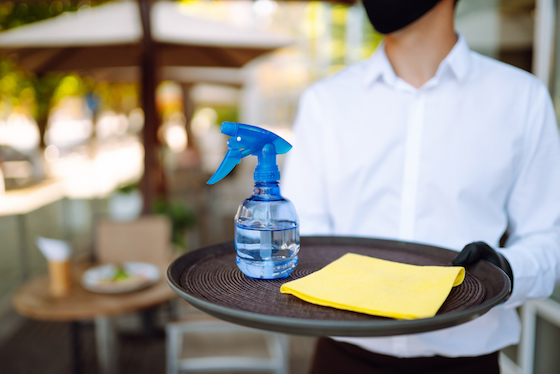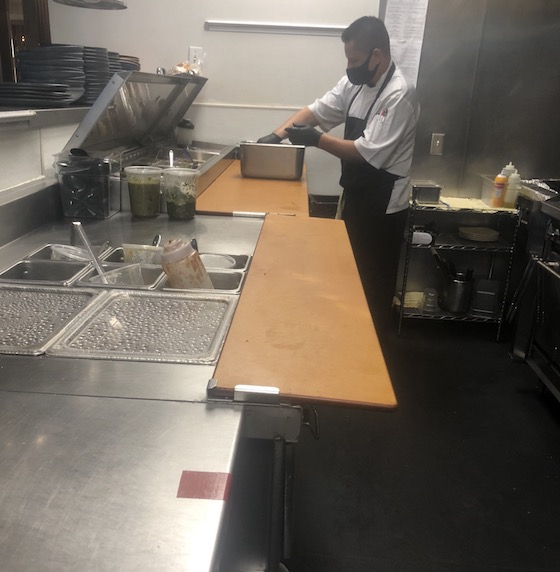Within F&B departments at hotels around the world, it’s safety first – and that means not only keeping the physical spaces clean but keeping the employees who make that possible safe, productive and engaged.
The Birkenhead House in Hermanus, South Africa, is working with 40% of its usual staff amid the downturn triggered by the COVID-19 pandemic, so General Manager Shane Brummer and senior sous chef Daniel Marais have divided kitchen employees into two teams.
“One team (is) working one week, and then being off while the other team works,” Brummer says. This not only gets more staff back to work, it also offers a strong safety benefit. “If one person on a team is exposed, then we can quarantine the whole of team one and then just bring team two on.”

Contributed by Jeanette Hurt
The Hotel Adlon Kempinski in Berlin also reduced staff levels, but Michéle Muller, head chef at Quarré restaurant, has taken the opposite approach: She began bringing members of different teams to work together. “I would mix and match the team members,” Muller says. “To be honest, the morale went up a lot during this time because we worked closer with each other, and we got to know each other better. If someone worked only in the evening and another person worked only in the day, they didn’t know each other.”
Staggered schedules
Staff deployment also helps keep social distancing within the kitchens themselves. At the Kimpton Hotel Palomar in Phoenix, Arizona, F&B Director Simon Dolinky examined all the tasks that needed to be done in a given day and deployed staff in a staggered schedule to do them.
“Scheduling is another component of safety,” he says. “Do you really need to have this employee here at the same time? If not, you have them come in a bit earlier, and they have the kitchen to themselves.”

Dolinky says tasks like prep work, baking and pasta making can be done earlier in the day, especially if a restaurant hasn’t yet re-opened for lunch. “Sometimes, three people in a small space offers the same productivity as two people with more space, because with three people there’s more waiting for things like getting into ovens,” he says.
At Bluehound Kitchen and Cocktails at the Palomar, work stations are marked off in 6-foot increments so staff is more aware of social distancing. “It’s just a reminder to mark off your work station and to stay within it,” Dolinky says.
To keep the kitchen from accidentally becoming contaminated by a delivery driver, a station has been set up outside of the kitchen. All supplies and food are received there and transferred into sanitized containers before they enter the kitchen.
“It just cuts down on the number of people in the kitchen,” he says. “Not everyone’s going to have that kind of space, but we were fortunate enough to have a building that provided a perfect area for that.”
Keeping up with changing regulations is hard. At Kimpton, a safety champion is designated who monitors all the PPE, ensures sanitation stations are stocked and manages procedures. Every month, a different staff member takes on the role.
“Our champion carries the torch for a particular directive,” Dolinky says. “As we rotate staff into this role, they become more engaged in the process, and every person who does this really gets to know all of the processes more in-depth.”
Keeping up morale
A clean and hygienic kitchen actually improves spirits, says Chef Walter Butti, executive chef at Six Senses Yao Noi resort in Phang-nga, Thailand. “When (staff) come into a clean kitchen, you can see that they’re happy,” he says. “A clean environment actually boosts your morale.”
At Kimpton, Dolinky says he always checks in with individual staff who are returning after a hiatus, because it can be disconcerting to be sequestered in your home and suddenly coming to a busy place filled with people. “Open lines of communication are important,” Dolinky says. “You want to make sure you’re not throwing too much at anyone, and you want to make sure people feel comfortable.”
At the Adlon, heads of departments serve treats like cookies or juice or cupcakes to staff. “It boosts your morale if your manager makes something for you and talks to you,” Muller says. “If you’re an apprentice or a housekeeper, and you don’t see the hotel manager every day, this makes them feel good. That interaction brings a smile to people’s faces. It’s simple, but it makes a big difference.”
